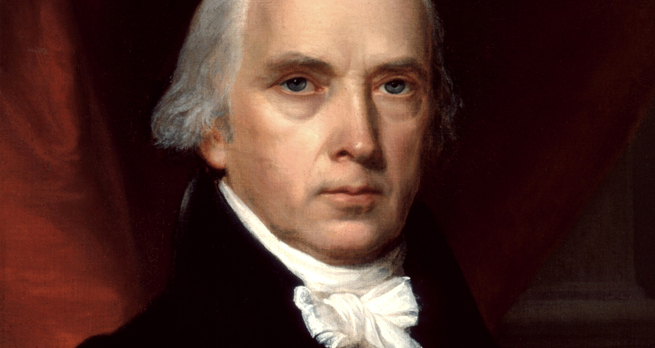 James Madison, on the receiving end of a hint about "rebuilding Washington"
The anxious attention which the events passing in Europe have for some weeks commanded, may be said to have made the people of England act as if it were impossible for anything of interest or of importance to us, to occur in another quarter of the world.
James Madison, on the receiving end of a hint about "rebuilding Washington"
The anxious attention which the events passing in Europe have for some weeks commanded, may be said to have made the people of England act as if it were impossible for anything of interest or of importance to us, to occur in another quarter of the world.
But for the vast magnitude of those changes which have occurred in the immediate vicinity of this country, our most serious consideration would have been attracted by what has occurred on the other side of the Atlantic.
Under other circumstances, we should have seen with uneasiness and sorrow (alarm is out of the question), the unfriendly, or rather the decidedly hostile feeling towards this country, which is still cherished by a large party in the United States of America. The same indefatigable spirit of mischief which provoked and sustained the late war [The War of 1812, which had endedthe the January 1815 Battle of New Orleans and the Treaty of Ghent ] has been, within these few months, a s much on the alert as ever to propagate the vilest calumnies against the conduct and intentions of Great Britain.
Our readers must remember that this country was placed by the intrigues of a party in the United Provinces, in a state of war with them, at a time when it was supposed the resources of England were so far exhausted by fighting the battles of Europe, that it was impossible for her successfully to sustain a new war.
On the first conquest of France, the American Government found it impossible to continue the contest with a hope of gaining any advantages, much less such as were absolutely necessary to console the people for the sacrifices to which they were compelled to submit.
Under these circumstances it was thought expedient to abandon all the ridiculous pretensions which they had formerly advanced, and every object for which the war had been advanced was at once given up.
It was hoped, and with some reason, that the experience of both nations had created a mutual indisposition to a state of hostility, and this effect has certainly been produced on every honest heart and rational head on either side of the water.
But unhappily those who stirred up the late contest, chagrined at the termination to which they had been compelled as they thought prematurely to bring it, seized the first opportunity that offered to attempt reviving the differences which had been adjusted at Ghent.
No sooner had the news of the 20th of March reached the American Continent [Napoleon had escaped Elba and returned to Paris], than it was supposed, the same triumph which attended the progress of Bonaparte to Parsi would still be his, in his operations against the rest of Europe.
Invested with the supreme power in France, they thought he might claim the empire of Charlemagne as his own, and England, engaged in a new struggler for the balance of power in Europe, would afford her foes in another quarter of the globe an opportunity for gratifying that hate which they failed to satisfy before.
Believing Napoleon re-seated on the throne, to be restored to all his former power, they prepared again to enlist among the effectives in the pay of "the child and champion of Jacobinism"; and every calumny that malice could invent, and brainless credulity report to the prejudice of England, was welcomed with rapture.
Already the Government were admonished not to let the list of their grievances increase, but (to use the elegant phraseology of the original) "to settle the score without delay."
In other words, to recur to hostilities, now that Great Britain had again got her hand full, as it was likely she would not soon again be at leisure to direct all her energies against an American enemy.
They thought a moment not less favourable than that of which they had availed themselves before , presented itself for indulging their animosity against the land of their progenitors, and no time was lost in setting forth its importance.
The battle of Waterloo with Bonaparte has defeated these speculations, for as yet we have no reason to think the American Government has committed itself to them.
In truth we should hope [President James] Madison and his friends will, for the present had enough to employ them in superintending the rebuilding of Washington; but we know they unfortunately count among their adherents all the war faction, whose language we have reason to fear continues to be that of Government.
The discomfiture of the hostile plans of the party we have referred to, is, perhaps, not one of the least beneficial consequences of the triumph of the Allies. We trust, however, what has already occurred will not escape the notice of the British Minister, and contemplating the probability of a new American war, whenever this country shall be again involved in difficulties similar to those from which she has just been rescued by the heroism of her sons, we hope adequate arrangements will be made in time to avert the danger; and that profiting from the hints thrown out by American journalists, our Government will not only "settle the score" without delay, if any fresh insult has been offered to our good faith, but also effectially guard against a new debt being contracted.
- The Morning Post, 24-08-1815




Rate and Review
Rate this article
Review this article
Log into OpenLearn to leave reviews and join in the conversation.
Article reviews